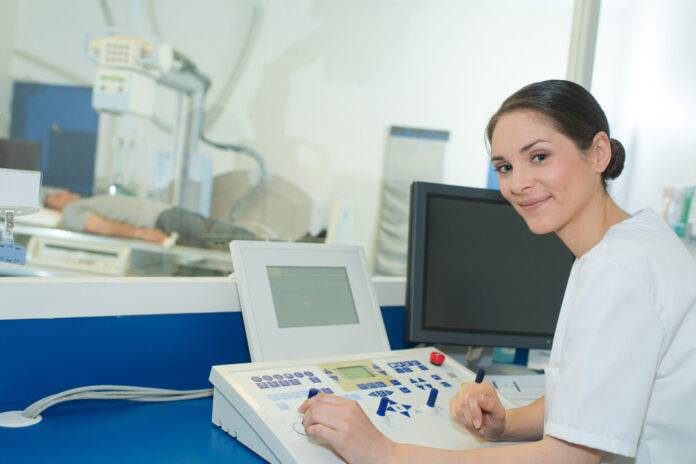
Do you have skills and experience in one of our featured occupations? If so, you could qualify for Canada Express Entry immigration. Submit your CV here.
Canada has opportunities for qualified foreign nationals to gain their permanent residence here through occupation-targeted Express Entry system draws for medical radiation technologists.
“The growing number of seniors is anticipated to lead to an increase in the demand for diagnostic services related to respiratory and cardiovascular health conditions,” notes the Canadian Occupational Projection System (COPS).
“The arrival of new medical technologies and techniques, as well as the introduction of more advanced equipment, will increase the demand for technologists.
In the decade ending in 2031, the COPS website forecasts there will be 20,100 new jobs for respiratory therapists, clinical perfusionists and cardiopulmonary technologists, medical radiation technologists and medical sonographers but only 19,400 applicants to fill them.
That’s an additional shortfall of 700 people to fill those jobs. Canada is hoping to resolve that labour shortage by boosting immigration.
Read More Canada Immigration News
Easing Of Restrictions Prompts Surge In Canada Immigration From Hong Kong
New Immigrants to Canada Need More Job Market Help
Prince Edward Island Issues 104 Canada Immigration Invitations In New PNP Draw
In May, Immigration, Refugees and Citizenship Canada (IRCC) changed Canada’s Express Entry system to allow it to target 82 jobs in healthcare, technology, trades, transport and agriculture starting this summer – including medical radiation technologists – and so opened the door to a new pathway to immigration for them.
The flagship Express Entry selection system had previously only conducted draws based on immigration programs, not by targeting specific occupations.
“Everywhere I go, I’ve heard loud and clear from employers across the country who are experiencing chronic labour shortages,” said then-Immigration Minister Sean Fraser.
Video
“These changes to the Express Entry system will ensure that they have the skilled workers they need to grow and succeed. We can also grow our economy and help businesses with labour shortages while also increasing the number of French-proficient candidates to help ensure the vitality of French-speaking communities.”
In late September, there were 704 job postings for medical radiation technologists on the Indeed.ca job-hunting website.
The federal government’s job-hunting and career-planning website, Jobbank, ranks the job prospects of medical radiation technologists as good over the next three years in Alberta, British Columbia, Manitoba, Nova Scotia, Ontario, Prince Edward Island, and Saskatchewan and as very good, its highest rating, in New Brunswick.
Occupation-Targeted Draws Started For Express Entry Programs This Summer
In Canada, the median hourly wage for medical radiation technologists, categorized under the National Occupational Classification (NOC) 2021 system with the code 32121, is $36.22 but that varies from a low of $25 right up to $46.15, reveals Jobbank.
Based on a standard, 37.5-hour work week, that means these workers could expect to earn a top median annual income of $89,992.
Candidates hoping to immigrate through Express Entry occupation-targeted draws need at least six months of continuous work experience in Canada or abroad within the past three years in one of these occupations to be eligible, experience that can have been gained while working in Canada as temporary foreign workers with a work permits or as an international student with a student visa.
Under the changes announced at the end of May, the Express Entry streams, including the Federal Skilled Worker (FSW) program, Federal Skilled Trades (FST) program and Canadian Experience Class (CEC), as well as parts of the Provincial Nominee Programs (PNP) are now more responsive to labour market needs.
Canada first signalled its intention to start occupation-specific draws through Express Entry in June last year, when changes were made to the Immigration, Refugee and Protection Act to allow invitations based on occupations and other attributes, such as language ability.
The majority of Canada’s provinces have been issuing occupation-specific invitations for several years.
Under the changes to the act, the immigration minister is required to consult provinces and territories, members of industry, unions, employers, workers, worker advocacy groups, settlement provider organizations, and immigration researchers and practitioners, before announcing new categories.
IRCC must also report to parliament each year on the categories that were chosen and the reason for the choices.
Employment and Social Development Canada (ESDC) says the number of occupations facing shortages doubled between 2019 and 2021. From 2018 to 2022, federal high skilled admissions accounted for between 34 and 40 per cent of overall French-speaking admissions outside Quebec, which manages its own immigration intake.
Are you ready to live and work in Canada? Fill out our free evaluation form to find out if you are eligible.
Become the right candidate with the job you always wanted with our online IELTS and EECP packages at skilledworker.com.
We are accepting international entrepreneurs to join our Start-Up Visa projects in Canada. Read more here.

